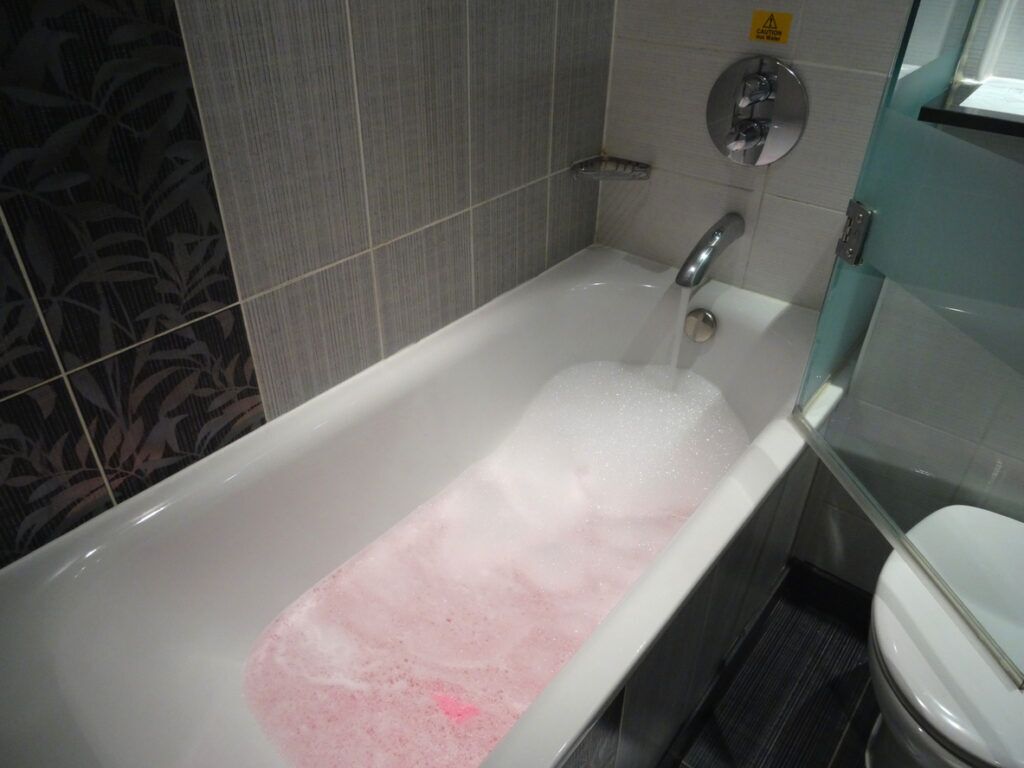Leading Reasons Behind Discharge Backflow in the Bathtub
Leading Reasons Behind Discharge Backflow in the Bathtub
Blog Article
Do you find yourself interested in info concerning Why is There Sewage Coming Up Through the Bathtub?

Sewer back-up in the bath tub can be an upsetting and unhygienic problem for any type of home owner. Not just is it troublesome, but it also positions major health threats and suggests underlying problems with the plumbing system. Recognizing why sewer is showing up via the bath tub is critical for taking ideal activity to deal with the problem effectively.
Introduction to the Problem
Understanding the Trouble
When sewage draws back up into the tub, it's a clear indication of a problem with the water drainage system. The wastewater that must be streaming away from your home is rather finding its way back into your space, which can lead to substantial damage and carcinogen.
Possible Causes
Several aspects can contribute to sewer backup in the bath tub. From clogs in the sewer line to issues with the plumbing framework, identifying the source is important for locating a solution.
Common Factors for Sewage Back-up
Obstructions in the Sewer Line
Among the most typical reasons for sewage backup is a blockage in the sewage system line. This can take place as a result of the build-up of particles, oil, or international things in the pipelines, protecting against appropriate circulation and causing sewer to support into your tub.
Tree Origin Invasion
Tree roots seeking wetness and nutrients can infiltrate sewage system lines with little fractures or joints. In time, these origins can expand and expand, causing considerable damage to the pipes and causing sewer backup concerns.
Aging Framework
Older homes might have outdated plumbing systems that are much more susceptible to deterioration, cracks, and deterioration. As pipelines age, they come to be much more prone to leakages and obstructions, enhancing the chance of sewer backup incidents.
Heavy Rainfall or Flooding
During periods of heavy rainfall or flooding, the sewer system may come to be overloaded with excess water, causing backups and overflows. This can lead to sewer supporting into bath tubs and other components inside the home.
Wellness Threats Related To Sewer Back-up
Contamination of Water
Sewage backup can contaminate the water system in your home, positioning a serious health danger to you and your family. Exposure to polluted water can result in intestinal issues, skin infections, and various other health problems.
Spread of Condition
Sewer has damaging bacteria, infections, and parasites that can cause a series of conditions, including liver disease, cholera, and gastroenteritis. Entering contact with sewage or infected surfaces places you in jeopardy of infection.
Mold Development
Wetness from sewer backup can develop perfect problems for mold and mildew development in your house. Mold and mildew spores can intensify respiratory system issues and cause allergies in delicate individuals, making timely clean-up essential.
Signs of Sewer Back-up
Foul Odors
Unpleasant odors emanating from drains or components, especially in the shower room, may indicate sewer back-up issues. These smells are usually strong and consistent, signaling a trouble that requires prompt interest.
Slow Draining Fixtures
Bathtubs, sinks, and commodes that drain pipes gradually or not in all could be experiencing sewer back-up. If multiple components are impacted simultaneously, it's most likely that the problem originates from a typical factor, such as the primary sewage system line.
Gurgling Noises
Strange gurgling or bubbling sounds originating from drains pipes when water is running elsewhere in your house are a measure of air entraped in the plumbing system. This air build-up can arise from sewer backup and need to be explored without delay.
Immediate Actions to Take
Shutting Off Water Supply
In case of sewage backup, it's essential to turn off the water to prevent more contamination and damages. Find the main water shutoff valve in your home and closed it off up until the concern can be resolved.
Speaking To a Specialist Plumber
Managing sewer backup is not a DIY job. Call a qualified plumber with experience in taking care of sewage-related concerns to assess the scenario and carry out required repair services or clean-ups.
Staying Clear Of Contact with Infected Water
Up until the sewage backup is resolved, stay clear of contact with contaminated water to prevent the spread of germs and virus. Wear protective gear if you need to remain in the afflicted location and clean your hands extensively later.
Safety nets
Normal Upkeep of Sewage System Lines
Set up routine evaluations and maintenance of your sewer lines to recognize and resolve possible problems before they escalate into major troubles. This can consist of cleaning particles, checking for tree root intrusion, and fixing any type of damaged pipelines.
Setting Up Bayou Valves
Think about installing bayou valves in your plumbing system to stop sewage from receding into your home throughout periods of heavy rainfall or flooding. These shutoffs automatically close when water draws back up, safeguarding your residential property from contamination.
Proper Disposal of Home Waste
Avoid flushing anything apart from toilet paper and human waste down the bathroom to avoid obstructions and blockages in the drain line. Dispose of oil, oil, and various other house chemicals properly to reduce the danger of plumbing issues.
Tidying up After Sewer Back-up
Sanitation Procedures
Completely sanitize and sterilize affected locations after sewer back-up to get rid of damaging germs and avoid mold and mildew development. Usage suitable cleaning products and safety gear to guarantee secure and reliable cleaning.
Reconstruction of Influenced Areas
Fix any damage to flooring, wall surfaces, or components caused by sewer backup. Relying on the degree of the damages, you may need to change carpeting, drywall, or other products to restore your home to its pre-loss problem.
Why is There Sewage Coming Up Through the Bathtub
Sewage in your bathtub is a major problem that can make you want to abandon the bathroom for good. You don’t have to. However, it is important to identify the source of the issue and take the necessary steps to resolve it in order to avoid any health risks and property damage. In this article, we will discuss what could be causing sewage to back up through your bathtub so you can take action quickly and effectively.
The Main Reason For Sewage Backup in The Bathtub
All the sinks and toilets in your home connect to different pipes that lead to the main sewer line. The sewer line then connects to the municipal sewer system. This connection works seamlessly on a daily basis, but there can sometimes be a problem with the main sewer line.
The most common cause of sewage backup is a clogged or blocked main sewer line. The main sewer line can be clogged due to the accumulation of debris, tree roots or grease buildup, or other materials. Another possible cause is a collapsed pipe. When this happens, your toilets and sinks won’t be able to drain properly. This is when sewage starts backing up through the bathtub. If the problem has been occurring for some time now, it might be time to consult with a plumber as there may be more severe damage that needs fixing.
How Can You Tell if it’s Coming From Your Sewer Line?
If you’re experiencing a sewage backup in your bathtub, then you can use a few simple methods to determine if it is coming from the main sewer line. First, try to unclog the tub drain with a plunger or an auger and see if that helps. If not, then inspect all of the drains in your house and check if there is any blockage in them. If some of the other drains are not working fine, then it’s likely the problem is with your main sewer line.
Common Signs of a Clogged Main Sewer Line
If you suspect that your main sewer line is blocked, then there are a few common signs to look out for. Frequent clogs in your home are a sure sign of a clogged sewer line. You can also check for slow drainage from all the plumbing fixtures.
Slow Drains
If you notice that it takes longer for your sinks and toilets to drain, then this could be a sign of a clogged main sewer line.
Frequent Clogs
Another common sign is that your drains or toilets become clogged almost all of the time. If this happens, then it could be a sign that the main sewer line is blocked.
Water Backup
Do you notice water or sewage coming back up from any of the drains in your home? If your answer is yes, you may have a clogged main sewer line.
Sinkholes
If you’ve noticed sinkholes in your yard or overflowing sewage from the ground, you may be facing a blocked sewer line issue.
Your Shower or Sink Makes Gurgling Noises
Have you noticed gurgling noises coming from your sink or shower lately? These are typically signs of a blocked sewer line and should be checked out immediately.
How to Prevent a Main Sewer Line Clog
Once you’ve identified that your main sewer line is clogged, it’s important to take steps to prevent it from happening again. The best way to do this is to avoid putting any solid material that can clog the drain, such as grease and other debris. You should also be mindful of what you flush down your toilet. In addition, you should schedule regular maintenance for your main sewer line. This will help keep it clear and free from clogs or backups.
What Should You do if You Notice Sewage Backing up Through The Bathtub?
If you’ve noticed sewage backing up through the bathtub, then it is important to call a professional plumber immediately. A plumber can inspect the situation and determine what the cause is, such as a blocked main sewer line. They will also be able to advise you on how best to fix the issue. In some cases, a simple drain cleaning may be all that is needed.
However, if the blockage is severe, then your plumber may need to use more advanced methods to clear the blockage.
No matter what, it is important to always call a professional plumber if you experience any kind of sewage backup. They will be able to assess the situation and provide you with a solution that is best for your home.
https://baylorinc.com/blog/why-is-there-sewage-coming-up-through-the-bathtub/

As a person who reads on Why is There Sewage Coming Up Through the Bathtub, I thought sharing that excerpt was really helpful. Sharing is nice. Helping others is fun. I love reading our article about What to Do if Sewage Starts Coming Up Through Your Bathtub.
Get Started
Report this page